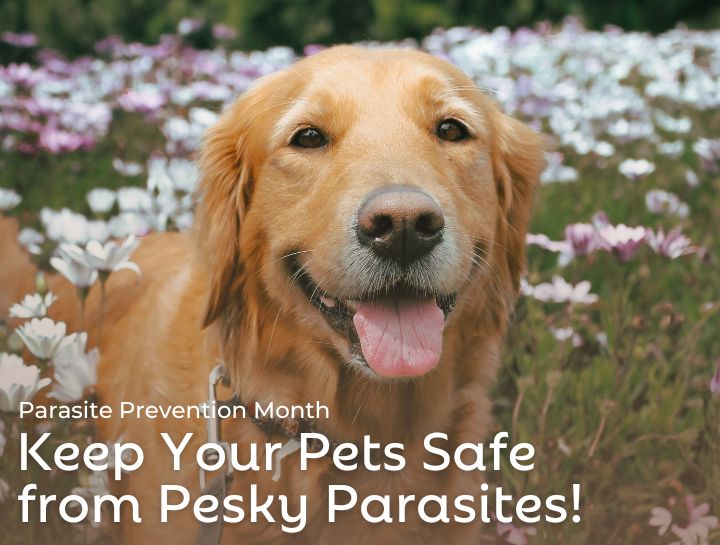Keep Your Pets Safe from Pesky Parasites!

As a pet parent, one of your most important jobs is to protect your furry friends from uninvited guests like fleas, ticks, and other parasites that can make them sick. By following a prevention plan, you can shield your pets from the dangers of heartworms, intestinal parasites, and flea and tick infestations. Let's dive into how you can keep your pets happy, healthy, and parasite-free!
What are Parasites?
Parasites are organisms that feed on or within other animals. While fleas and ticks are the most well-known, other common parasites include mites, lice, heartworms, and various intestinal parasites. Parasites can be external or internal.
External Parasites: Fleas, Ticks, & Mites&
Fleas
Fleas are prevalent in all climates, and both cats and dogs are susceptible to infestations. Fleas can transmit diseases to humans, including Bartonella henselae ("cat scratch fever") and Yersinia pestis (the bacteria responsible for the Bubonic plague). Beyond skin irritation and discomfort, fleas can also cause:
- Deadly infestations
- Flea-allergy dermatitis
- Flea-related anemia
- Transmission of tapeworm parasites if ingested
Ticks
Ticks are parasitic arachnids that feed on the blood of animals and can cause Lyme disease in humans and other tick-borne diseases such as Ehrlicia and Anaplasma in pets. Pet owners should inspect their pets regularly for ticks, especially around the head, neck, feet, and ears, particularly after being outside in wooded or grassy areas.
Mites
Ear and certain skin mites (scabies) are difficult to see, but extremely contagious in cats, dogs, and pigs. Mites are passed through direct contact between animals and can also be transmitted to people who come into direct contact with infected animals. Left untreated, mites can lead to serious secondary infections. If you notice the following symptoms in your pets, take them to your veterinarian to check for mites:
- Head shaking and scratching at ears
- Dark waxy or crusty discharge from the ear
- Inflammation and irritation on the skin
- Hair loss from excessive scratching
Intestinal parasites that affect pets can be transmitted to humans, causing serious conditions. Internal parasites that can affect humans include roundworms, hookworms, tapeworms, giardia, and cryptosporidium.
Heartworm
Heartworm is a life-threatening parasite spread by mosquitoes. As its name implies, heartworms live inside the right side of the heart and within the pulmonary vessels coming out of the right side of the heart in dogs and can grow close to 12 inches long. Cats are less commonly affected, but rather than living in the heart, heartworms in cats typically live within the lunch and are much more likely to be fatal. We suggest that cats and dogs are on year-round preventative medications for heartworms.
What You Can Do
Thankfully, there are easy steps that loving pet parents can take to protect their pets and families from parasites. Our veterinarian team at Ashland Animal Hospital is ready to help you find the right parasite preventatives to keep your pets happy, healthy, and parasite-free. Here are some steps you can take:
- If your pet isn’t on flea, tick, or heartworm preventative, make an appointment with us to create a plan that’s best for your pet.
- Schedule regular wellness checkups for your pets.
- Give your pet its parasite-preventative treatments year-round.
If you think your pet may have an issue with fleas, ticks, or other parasites, or you need to renew your prescription for parasite preventatives, call our office at (508) 881-2400 to schedule an appointment.
